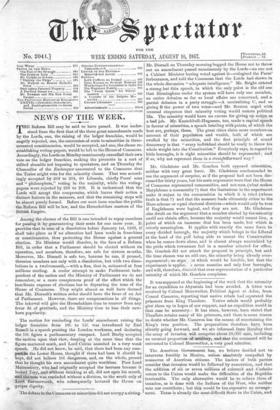The debate in the Commons on minorities did not occupy
a sitting.
Mr. Disraeli on Thursday morning begged the House not to throw out an amendment passed unanimously by the Lords—no one not a Cabinet Minister having voted against it—eulogized the Peers' forbearance, and told the Commons that the Lords had shown in the whole discussion " adequate intelligence." Mr. Bright uttered a strong but thin speech, in which the only point is the old one that Birmingham under the system will have only one member, an entire delusion as far as local affairs are concerned, and a partial delusion in a party struggle—A neutralizing C, and so giving B the power of two votes—and Mr. Buxton urged with unusual eloquence that minority voting would restore political life. The minority would have no excuse for giving up action as a bad job. Mr. Knatchbull-Hugessen, too, made a capital speech in favour of minorities, a speech bristling with points, of which the best are, perhaps, these. The great cities claim more members on account of their population and wealth, both of which are swelled by the minorities, and the first principle of sound democracy is that " every individual should be ready to throw his whole weight into the Constitution." Everybody says, in regard to little boroughs, it is right minorities should be represented ; and if so, why not represent them in a straightforward way ?






























